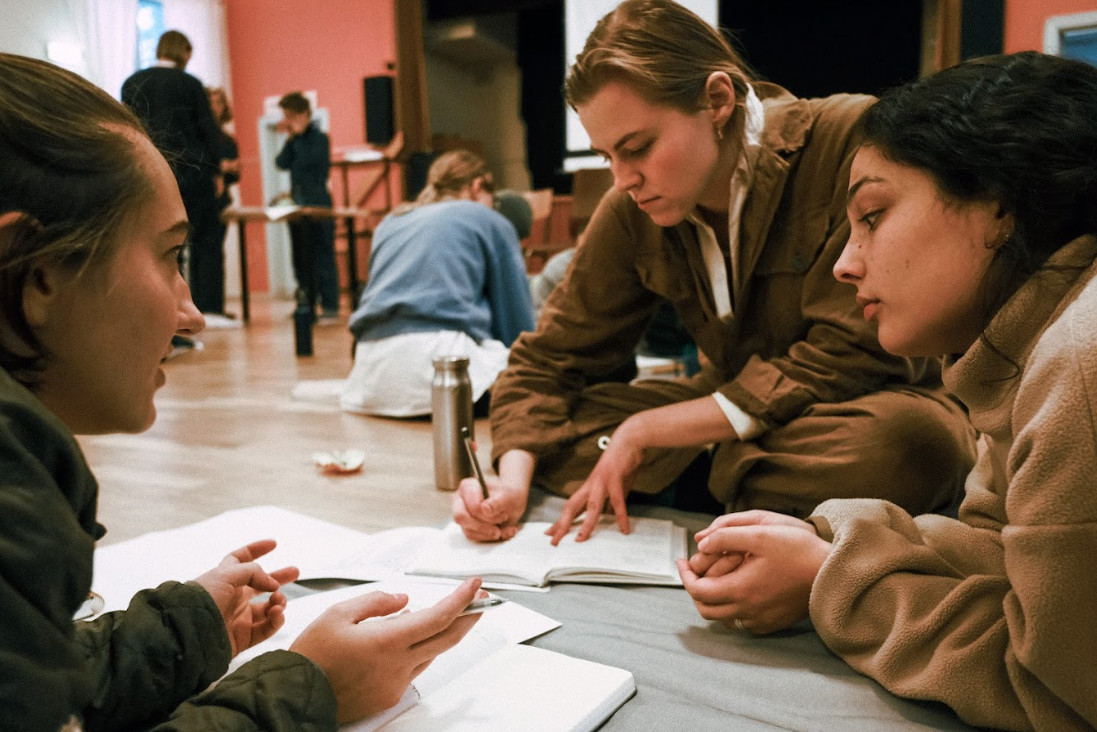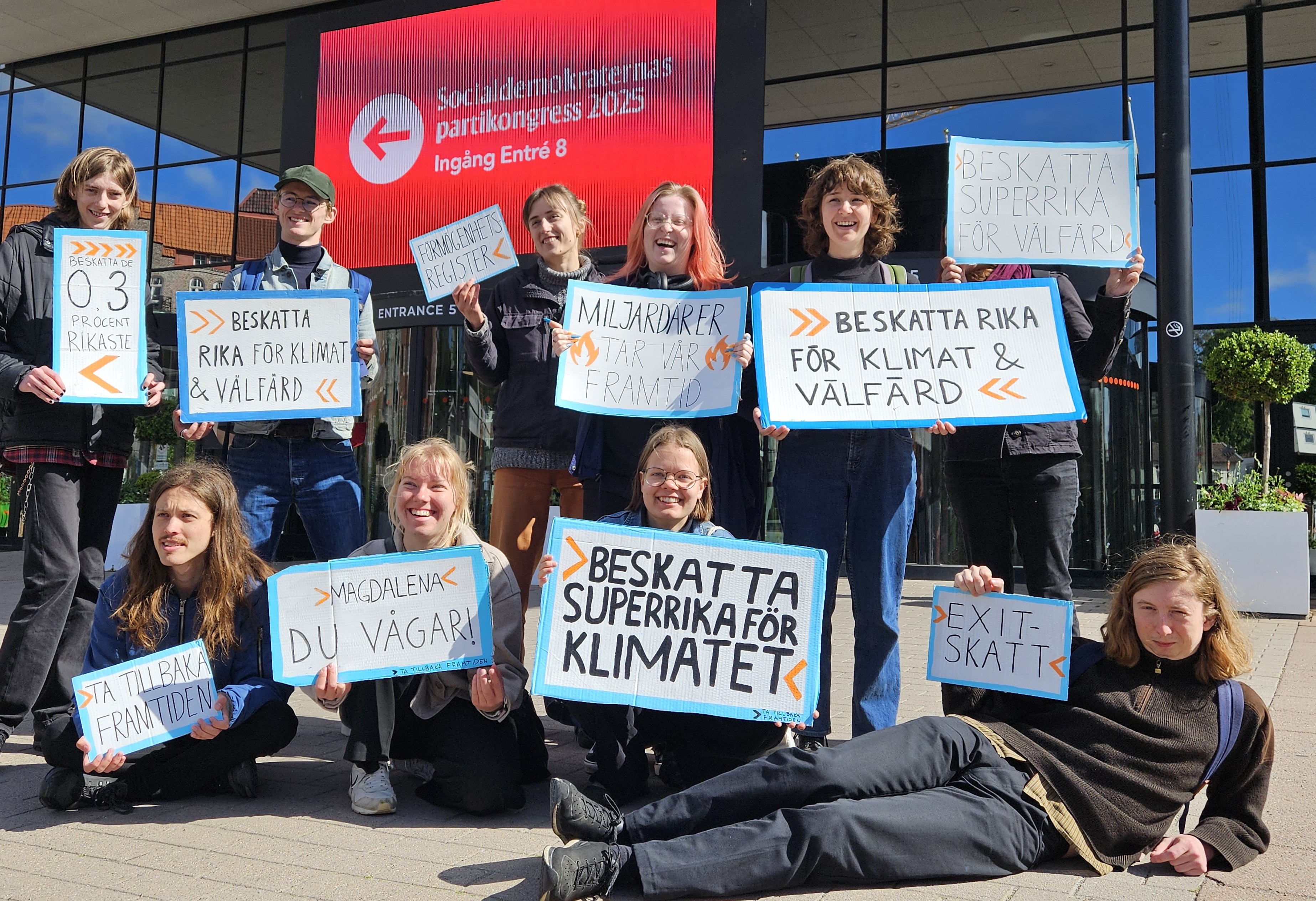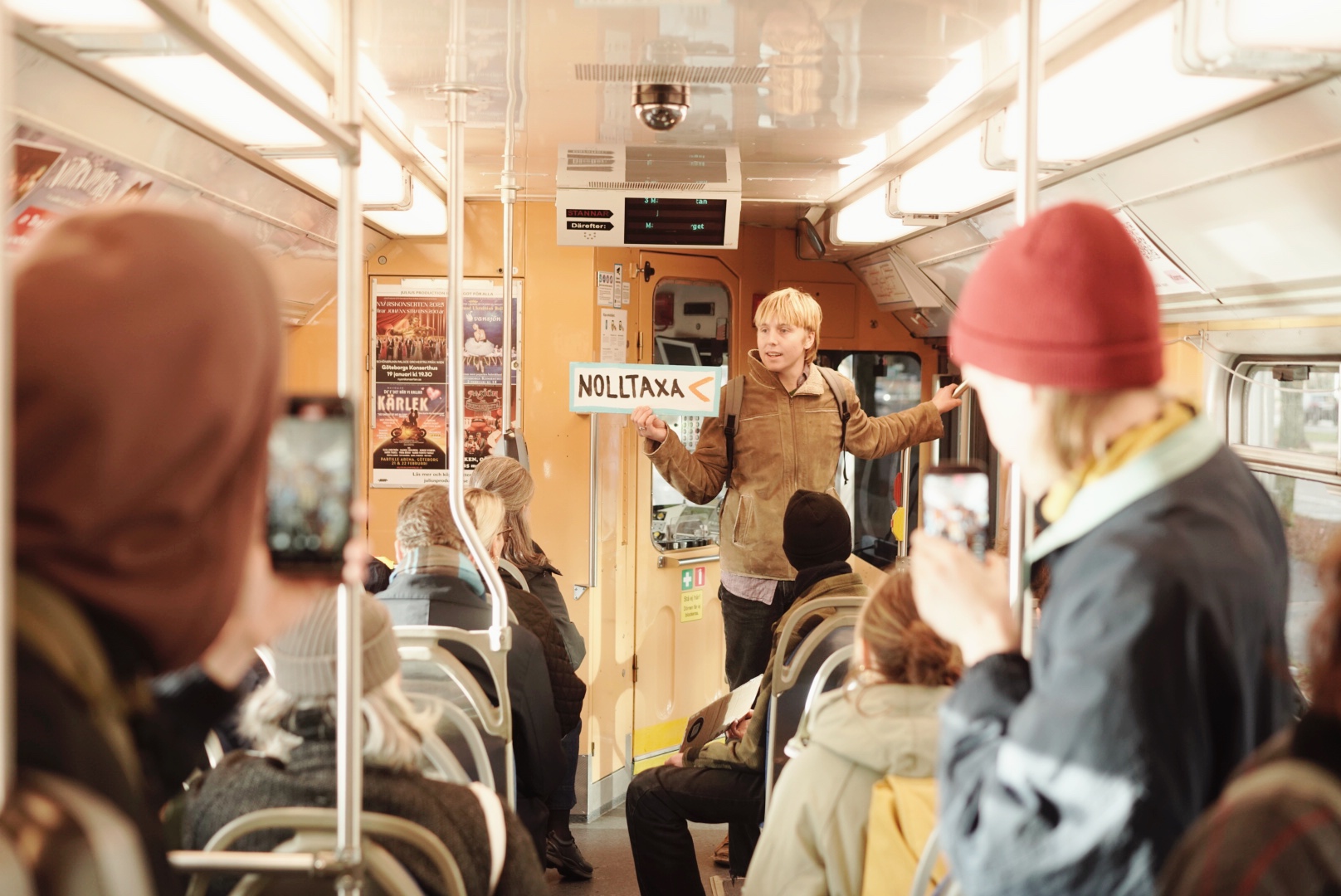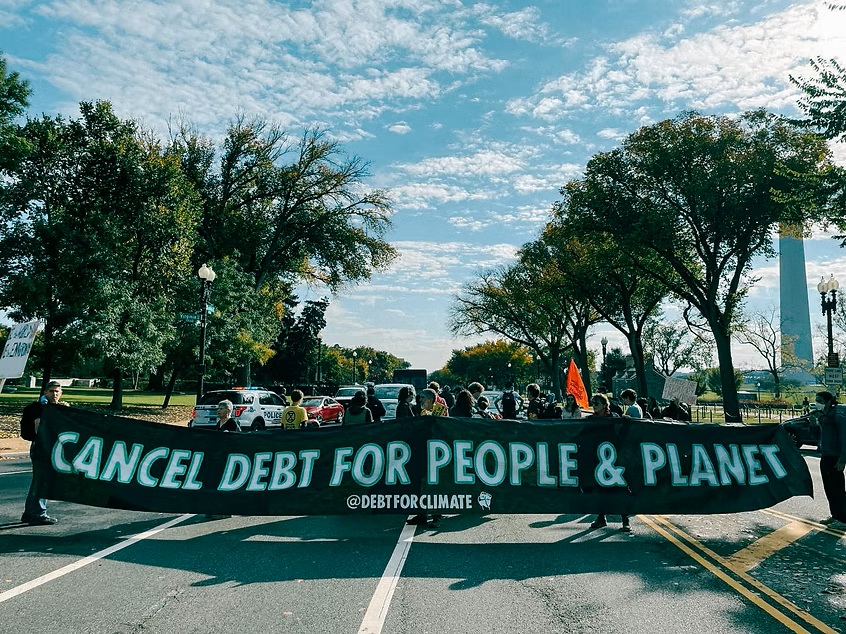Political proposals
to reclaim the future

In the past year Reclaim the Future has been developing proposals for political reforms. The political proposals are here to help us get closer to the future we want and need and to explain some of the problems we see with the present time. We will continue to update and work on developing these proposals.
This is a summary. The full version in Swedish is avaiable here as a PDF.
BUILDING A BETTER SWEDEN
“We are happier, healthier, and stronger together. The ultra-rich and the systems that enable them are fundamentally anti-human. Neither the current system nor those that wield the most influence over it have the people’s best interests at heart. Therefore, we need to.”

Sweden and the Western World’s use of resources is exceeding the limits of the planet. Fossil fuels are warming our world and are already causing irreversible damage. Dying species, illnesses and extreme weather. More people whose lives are cut short, whose family members, homes and livelihoods are taken from them. In a world that keeps getting warmer, every tenth of a degree counts. Therefore, rapid decisions and far-reaching projects are needed to bring society to a fossil-free and resource-efficient state. Large-scale political, social, and economic projects that channel people's voices, needs, and frustrations is the only way to avert larger ecological crises. Reclaim the Future seeks to be a part of, and help build, a large coalition of climate movements, activists, and communities to fight climate collapse. There are major challenges and obstacles ahead, but we are certain that the only way through them is forward.
Sweden has become one of the most unequal societies in Europe, which has led to the voices of the people in our political system being drowned out by those of the super rich. Societies which are unequal at a systemic level of course have a difficult time transitioning, given that the elites who hold political influence do not want to give up their power and wealth, much of it related to their carbon-intensive investments and businesses. We must organize to combat the increasingly unequal society while addressing the skewed distribution of influence over the economy, democracy, and climate policy that inequality creates. Capitalism and neoliberalism, the dominating economic model in Sweden since the 1990s, have created a society that prioritizes profits over people in the very structure of the systems. These profits are to a high extent created from unsustainable resource extraction that has put us in a climate collapse.
Hyper-individualism is tearing us apart. Longer working weeks and constant attacks on the welfare state from both sides, and increased inequality leading to further alienation from ourselves and our neighbors have left our communities weakened. These proposals acknowledge this reality, but also are rooted in an understanding that teamwork and togetherness is the only way forward. This means stronger unions, associations and neighborhoods. We need cities and villages that prioritize the care of all neighbors, and a political system that reflects and represents people's needs. We are happier, healthier, and stronger together. The ultra-rich and the systems that enable them are fundamentally anti-human. Neither the current system nor those that wield the most influence over it have the people’s best interests at heart. Therefore, we need to.
Taxing the rich is a climate policy in itself: The richest 1 percent of the world's population produced as much carbon pollution in 2019 as the five billion people who made up the poorest two-thirds of humanity. Sweden has one of the highest proportions per capita of billionaires in the world. Sweden, and the world's wealthy, are destroying our future. The richest 10 % of the world is responsible for 50 % of the total emissions. Therefore, a tax policy is a key part of climate policy. Taxing the ultra-rich is also crucial to funding the climate projects that make Sweden more livable and sustainable for everyone.
We believe that it is both possible and deeply necessary to dismantle the current fossil-fuelled society and develop the sustainable society of tomorrow. This transition must take place democratically and fairly, here in Sweden and abroad. The final destination is a society with democratic resource sharing, strong welfare and a limited use of resources.
We need a vision and leadership that we do not currently see among our politicians here in Sweden. We share these proposals to take a meaningful step towards transforming the conversation around what is necessary and possible. Any political vision worth pursuing here in Sweden has to address the ultra rich in Swedish society. They steal from working class people every day because politicians let them. They insist on tax havens for them and austerity for the rest of us. They use a vastly disproportionate amount of fossil fuel, creating emissions that make our lives increasingly unhealthy and unstable. Their greed makes our future grim, but we can stop this.
Reclaim the Future therefore proposes:
- that the ultra-rich are taxed to finance the climate transition and improve welfare. The figure fluctuating in global conversations is 2%. This is a good start, but Reclaim the Future also believes that the rich can contribute much more. We therefore also propose a 3% tax on net assets over 500 million and a 5% tax on net assets over 10 billion.
- that a ban is introduced on investing in and lending money to fossil fuels, in Sweden and globally. Swedish banks and taxpayers shall not contribute money to fossil fuel production.
- that existing fossil fuel industries, such as refineries, must immediately begin a planned transition away from fossil fuels where biofuel production is limited to ecologically sustainable levels. If companies cannot do this, people must push for fair nationalisation and decommissioning of the fossil fuel industries without compensation for its owners.
- that 30% of Sweden's land and seas are protected by legislation from all exploitation and restored by 2030, in accordance with the Convention on Biological Diversity (CBD). Only nature conservation workers shall be allowed in these areas and the areas should be large and cohesive. Examples of measures to achieve the target include forest protection, reintroducing shoreline protection, and restoring wetlands.
- that Sami people shall have control over decisions regarding land used by Sami villages and Sami families.
- that Sweden signs and actively promotes the Fossil Fuel Non-Proliferation Treaty - a global non-proliferation agreement for fossil fuels. The treaty has already been signed by 17 nation states including Pakistan and Colombia, as well as the World Health Organisation and the EU. States that do not transition should face consequences in the form of tariffs, boycotts or other forms of necessary pressure.
These proposals require a fundamental shift in how Sweden uses its land–shifting from a model of domination, destruction, and extraction to one of care and sustainability. Such a transition would entail enormous changes for our economy, our politics, our society, and for our lives.
These big reforms make it possible to live a just life that is both prosperous and sustainable. The everyday lives of people must be the focus in the society we create. The power must be in the hands of the people and welfare needs to be rebuilt. This is a beginning step for fair climate transition and climate justice in Sweden.
CREATING A MORE SUSTAINABLE EVERYDAY LIFE
“We are stuck in a fossil-fuelled society that is stressful, sad and harmful, and we do not know how to get out of it. Regardless of where we come from, what our background is and where we live it is important that people can influence their own living conditions.”

Today, our lives are characterised by rapid consumption, a dependence on unsustainable systems and a sense of hopelessness with little opportunity to influence change. The problems we see around us, with constant warnings of climate catastrophe, war and attacks on democracy, can feel big and far away. At the same time, we can't even do the small things in our daily lives: we can't use public transport when bus routes are cancelled, we can't shop organically when food prices are skyrocketing, it's easier to order new clothes than to mend old ones. We are stuck in a fossil-fuelled society that is stressful, sad and harmful, and we do not know how to get out of it.
Regardless of where we come from, what our background is and where we live it is important that people can influence their own living conditions. We need to be inclusive and understand each other's circumstances. In a society built on a perpetual spiral of work and consumption, this is almost impossible. We need time to recover, take care of our relationships, do what we think is important in life, and create the care and community we need in a healthy society. The following suggestions are essential for building the future we want together, but they also have the potential to dramatically increase the joy, connection, and sustainability of our present.
Reclaim the Future therefore proposes:
- that all of society adopts a 6-hour working day. Reducing working hours increases the possibility of a freer life and leisure time that consists of more than preparing for the next working day. This also frees time for community engagement outside of immediate family care.
- that people whose jobs are affected by the transition away from a fossil-fuelled society are offered publicly funded retraining. The knowledge and experience of people working in sectors affected by the transition needs to be taken into account and people in those industries must not be abandoned. We all have something to contribute to the equitable society we deserve.
- that public transport throughout Sweden, in rural areas as well as in cities, should be fully tax-funded so that it is free for residents and visitors.
- that cities are rebuilt according to a 15-minute model where schools, jobs, grocery stores and cultural centers are within a 15-minute walk or bike ride, and that all cities build safe bike lanes.
- that people who cannot bike or use public transport should have access to electric vehicles, especially in rural areas but also in cities if necessary.
- that shared ownership and repairs become easy and accessible throughout society.
ENSURING A JUST TRANSITION GLOBALLY
“Only by cooperating across borders, especially with countries in the Global South, is a safe, sustainable and just future possible.”

Our collective every day lives in Sweden both shape and are shaped by the entire global community. The climate in Sweden, and around the world, is impacted by the emissions produced through the destructive, extractive systems of capitalism, colonialism, and the extreme wealth and global imbalance they create. “Only by cooperating across borders, especially with countries in the Global South, is a safe, sustainable and just future possible.”
The global trade, together with a broken global tax system, are two pillars that have led to the collapse of international solidarity and enormous climate injustice. They are destroying the environment while failing to provide, especially countries in the Global South, the resources needed for a just transition.
The following political proposals offer a major step toward creating more livable, equitable conditions that target global systems. It is the moral, political, and economic responsibility of Sweden and Europe as past and present colonial powers. Not only are these proposals an extension of solidarity, but they are necessary for a healthy and habitable Swedish future.
Reclaim the Future therefore proposes:
- that debts from the IMF, the World Bank and rich nation states are written off from countries in the Global South.
- that the global trade system is redesigned to favour countries in the Global South. Instead of these countries' raw materials being sold cheaply to the Global North, prices should be raised and these countries given the opportunity to develop their welfare.
- that state-owned fossil fuel companies are subjected to strict divestment plans and are forced to use their capital and returns to transition away from fossil fuels.
- that privately owned fossil fuel companies create and follow rapid divestment plans. If this does not happen, the companies should be nationalised and closed down as described above without compensation to their owners.